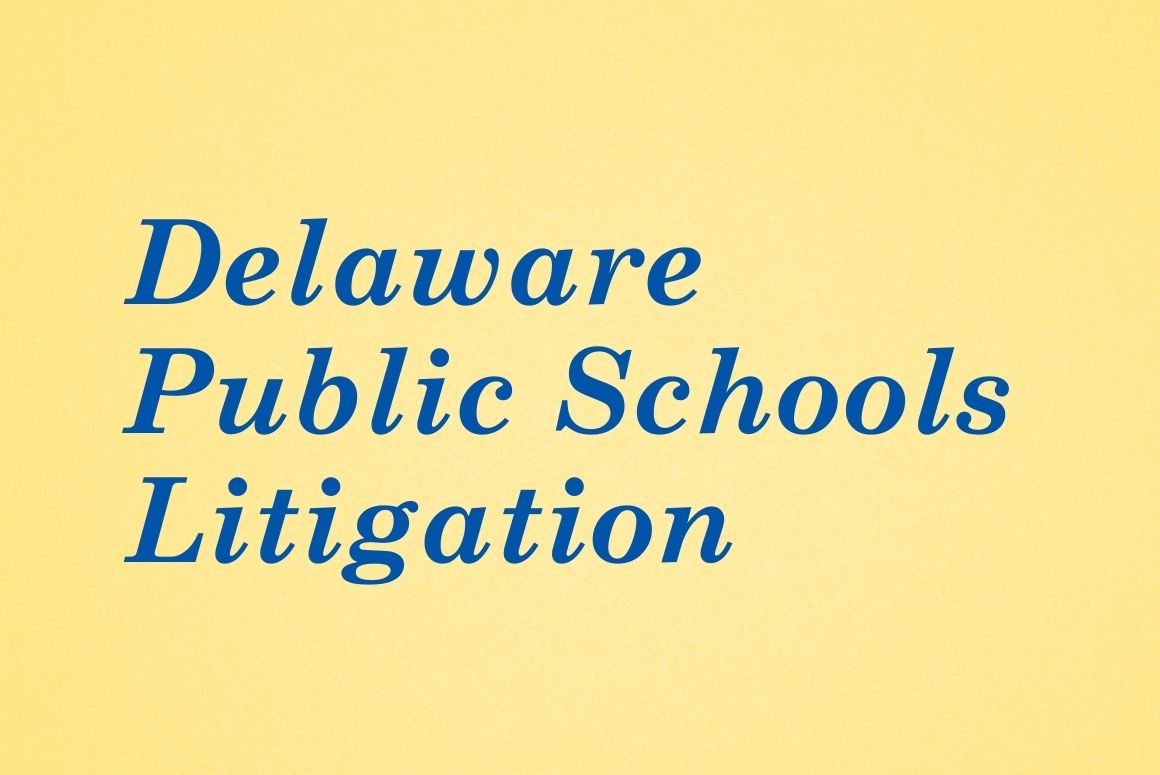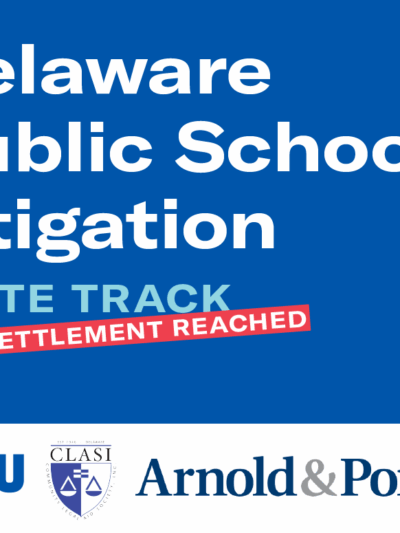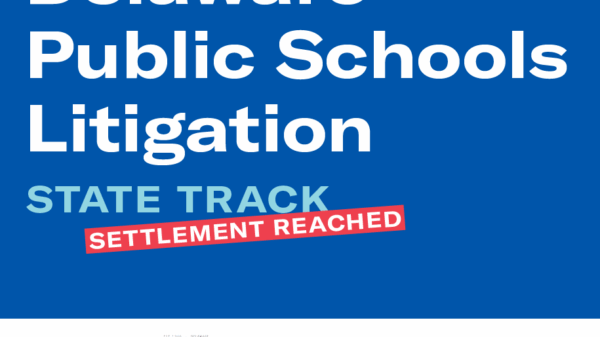Delaware Public Schools Litigation
- Filed: 01/16/2018
- Court: Court of Chancery
- Latest Update: Sep 18, 2018

Update 4/14/2021: Agreements reached on all tracks of the Public Schools Litigation!
Update 4/14/2021:
“This agreement brings our years-long litigation to a close, and we couldn’t be happier about the end result. By 2025, Delaware’s low-income and English language learner students, and students with disabilities, will have significantly improved resources to help provide them the education they deserve. This is an historic win for all of Delaware’s public schools.” —Mike Brickner, ACLU-DE executive director
On Tuesday, April 13, 2021, our legal team reached the final resolution in the county track of our Delaware Public Schools litigation with Sussex County.
The Sussex County agreement is the last in a series of agreements that have been reached in this litigation effort, and it paves the way to a systemic shift in funding resources for some of Delaware’s most vulnerable students.
The most recent property tax reassessment for Sussex County was completed in 1974. This agreement requires the county to update those outdated property values by promising to complete a reassessment on taxable real estate in time for the tax bills that will be sent out after July 1, 2024 (fiscal year 2025). Like the other two county agreements, this reassessment will also set the stage for regular, periodic assessments moving forward, and correct the disproportionate tax burden that owners of lower-valued properties have carried for too long.
The Delaware Public Schools litigation is now considered closed, and no further proceedings are expected to take place. The attorneys and plaintiffs in this case look forward to continuing to work with the State of Delaware and each county to ensure that the terms of each settlement are met, and that ultimately, Delaware’s public school students get the support and resources that they deserve.
Update 2/25/2021:
On Wednesday, February 24, 2021, our legal team reached another resolution in the county track of our Delaware Public Schools litigation, this time with Kent County.
The Kent County agreement, similar to the New Castle County agreement, requires the county to resolve a long-standing and unlawful flaw in its tax system, by updating property assessments to current value rather than the 1987 base Kent County has been using for decades. The failure to reassess for so many years has had a negative effect on school funding, which relies in part on local taxes for operating funds. The reassessment will also set the stage for regular, periodic assessments moving forward, and correct the disproportionate tax burden that owners of lower-valued properties have carried for too long.
The court-approved agreement promises that Kent County will complete a general reassessment by July 1, 2024 (fiscal year 2025).
Litigation with Sussex county on this track of the case is still active.
Update 2/1/2021:
On Tuesday, January 26, 2021, our legal team reached an historic resolution with New Castle County in the county track of our Delaware Public Schools litigation.
The agreement, which is another historic step toward ensuring greater equity in public education, promises that New Castle County will complete tax property reassessment by fiscal year 2024, which will modernize the outdated property tax issue by reassessing taxes based on current property values and set the stage for regular, periodic assessments moving forward. The agreement will also help to correct the disproportionate tax burden that owners of lower-valued properties have carried by requiring owners of higher-valued properties to pay taxes based on their properties’ true value.
Litigation with Kent and Sussex counties on this track of the case is still active.
Update 10/12/2020:
We are thrilled to announce that the ACLU of Delaware, Community Legal Aid Society, and Arnold & Porter have negotiated a settlement on behalf of our clients NAACP and Delawareans for Educational Opportunity with and Governor John Carney in our landmark lawsuit to ensure adequate funding for all students in Delaware’s education system.
On Monday, October 12, the court approved our settlement, which guarantees the following:
- $25 million in Opportunity Funding, which was instituted on a temporary basis after the lawsuit was underway, used to enhance services and provide additional resources to English learners and low income students, will become permanent and more than double to $60 million by the 2024-2025 school year. After that, the $60 million will increase proportionally with student growth.
- Opportunity Funding resources will be allocated specifically to the schools serving English language learners and low income students, in proportion to the number of those students at each school. $5 million of these funds will be reserved for mental health and reading supports in schools with the highest concentrations of low income and English learner students.
- Funding dedicated to basic special education students in Kindergarten through 3rd grade to equal funding currently in place for basic special education students in grades 4-12 by the 2023-2024 school year.
- By the 2023-2024 school year, the Early Childhood Assistance Program, which funds preschool programs for low income families, will double its funding from $6.1 million to $12.2 million.
- A $4 million annual commitment to support enhanced teacher recruitment and retention in high-needs schools beginning in the 2022-2023 school year.
- An ombudsperson program will be adopted to assist individual students and families in resolving disputes or complaints concerning disparate discipline, inequitable access to school programs, and different or unfair treatment.
- School districts seeking voter approval for capital construction and major renovations will be required to distribute an equity statement to explain how the capital project would impact equitable distributions of new and renovated buildings within the district.
- The State will hire an independent organization to complete a holistic assessment of the Delaware public school finance system by January 2024, which shall consider funding levels, revenue mechanisms, equity, and efficiency.
These are historic, systemic changes that will benefit the most vulnerable students. We are grateful that Governor Carney agreed to increased funding rather than continue protracted litigation. However, we know that these changes alone will not fully guarantee equity, and we will continue to press forward with our advocacy on fair discipline, the school-to-prison pipeline, and access to education.
We now await further proceedings on the County Track of this case, to determine the timing and manner of an appropriate remedy for the counties’ property tax assessment system that the Court ruled in May violates the Delaware Constitution and state law.
The ACLU of Delaware and the Community Legal Aid Society would like to extend a special thank you to the team at Arnold & Porter, who have been indispensable allies on this case. We would also like to thank the State for putting forth a genuine effort to resolve this lawsuit in the best interest of Delaware’s current and future students.
Update 5/8/2020:
The American Civil Liberties Union of Delaware and the Delaware Community Legal Aid Society, Inc. are excited to announce a victory in the county track of our education funding lawsuit: Delawareans for Educational Opportunity v Carney. On May 8, 2020, the Court ruled that counties’ reliance on decades old valuations for property tax assessment violates Delaware law and Delaware’s Constitution.
Dan Atkins, Executive Director of CLASI, said “For 75 years CLASI has been advocating for Delaware’s most vulnerable citizens. [This] ruling is a welcome step towards providing children living in high poverty communities with the educational opportunity everyone should want for them.”
Fixing the counties’ inequitable and outdated system of property tax assessment is an important step toward ensuring that education funding in Delaware is fair and adequate. Our funding system must be designed to meet the needs of all of Delaware's children, especially those who have historically been marginalized and underserved. We are pleased with the Court's ruling.
Next step: Further proceedings will be scheduled to determine the timing and manner of an appropriate remedy for the County Track violations. Trial is still set for November in the state track of this lawsuit.
We’d like to extend a special thank you to the team at Arnold & Porter, who have been indispensable cooperating attorneys on this case.
Update 3/4/2020:
Just over two years ago, ACLU of Delaware, along with Community Legal Aid Society (CLASI), filed a lawsuit in the Delaware Court of Chancery on behalf of Delawareans for Educational Opportunity and the Delaware NAACP. The lawsuit, in support of underserved public school children, consists of two separate claims with one big aim: getting our state and counties to do what they must to ensure that all students will have a meaningful opportunity to receive an adequate education, regardless of their geographic location, language, income, or ability status.
A lot has happened since we filed on January 18, 2018. After we prevailed against motions to dismiss from all defendants, the Court split the case into two “tracks,” one addressing claims brought primarily against the 3 counties, and the other focused on claims regarding state funding for education.
In the piece of the suit focused on local money for schools, we went to trial in July 2019 and concluded post-trial submissions to the court in mid-January 2020. During trial, we argued that the counties’ outdated property assessments violate the Delaware Code and the Uniformity Clause of the State’s Constitution by collecting taxes based on property assessments from the 1970s and 80s —therefore creating disparate outcomes for property owners, such as those described in this New York Times article on Fair Housing, and constant funding crises for schools whose tax base has remained artificially stagnant for decades.
We hope to see a ruling on liability in the county track of this lawsuit by summer. The ruling should determine whether each county is responsible for reforming their tax collection practices to comply with the law—likely by reassessing.
On the state track of our lawsuit, we are currently engaged in intensive pre-trial preparation and we’re scheduled for a three-week trial beginning on November 4, 2020.
Outside of the courtroom, this lawsuit has already made an impact on Delaware’s education funding. Since we filed, we’ve seen a shift in the conversation about the urgent need to reform our schools’ education funding systems. This shift in urgency, combined with our pending lawsuit, put pressure on state lawmakers and other stakeholders to take action to address student needs that have gone unmet, despite having been the focus of numerous reports, task forces, and recommendations over the last 20 years. Since 2018, Governor Carney, with support from legislative partners, has:
- Proposed a three-year $75 million Opportunity Funding Initiative to target resources toward Delaware’s most disadvantaged students, including additional funding for mental health supports; and
- Announced a plan to invest $50 million to build a new school on the East Side of Wilmington and to renovate Bayard on the West Side.
- Announced an expansion of 50% in the number of seats available in a state-funded early childhood program for low-income families.
These reforms are important steps, and we support the investment in meeting the needs of some of Delaware’s most vulnerable children. We will keep fighting until the investments are more substantial and become permanent parts of our education funding system. Our children, and the future of our state, depend on it.
We’d like to extend a special thank you to the team at Arnold & Porter, who have been indispensable cooperating attorneys on this case.
Update:
This morning the Court of Chancery issued an opinion in our lawsuit to ensure adequate and equitable funding for public schools. The suit was brought by two civil rights organizations, Delawareans for Educational Opportunity and the Delaware NAACP.
Vice Chancellor Laster ruled in a 135-page opinion that the Delaware Constitution “obligates the State of Delaware to create and maintain a system of public schools that successfully educates Delaware’s students.” He also ruled that the Constitution’s “Education Clause grants the State broad discretion over the means it chooses to achieve this end, as long as it achieves that end” and that “the issue in this case is whether the means that the State has chosen is achieving that end for Disadvantaged Students.” Determining that the complaint “pled sufficiently that Delaware’s system of public schools fails to provide an adequate education to Disadvantaged Students,” he denied the state’s motion to dismiss the case. The Opinion also states:
"A court must also take into account and afford due deference to the political branches’ efforts to address the multi-faceted and ever-evolving challenges inherent in designing and implementing an educational system. No system will be perfect. Ultimately, however, the Education Clause contains a qualitative component, and a complaint can state a claim for a violation of the Education Clause if it sufficiently alleges (as is undisputed here) that the State has failed to meet it.
. . .
The plain language of the Education Clause, its legislative history, and decisions from other states all point to the conclusion that the Education Clause has a qualitative component. The Education Clause requires that the General Assembly establish and maintain a system of public schools that lives up to that description in substance and not just in form.
. . .
Like the vast majority of other courts that have interpreted similar provisions, I do not believe that the Education Clause grants the General Assembly the authority to self-monitor, thus depriving the judiciary of its role in a system of checks and balances. The Education Clause assigns a task to the General Assembly. It does not manifest a textually demonstrable commitment to the notion that the General Assembly should judge for itself whether it carried out that task."
Our case is strong. The Delaware Constitution requires effective schools and it is the role of the court to ensure that the constitutional commitment is being met. This lawsuit is important because many high poverty schools in both rural and urban areas are receiving fewer resources per student than schools with students who are better off. As a result, low income students, English language learners and students with disabilities are being left behind.
To read all related documents, please scroll down to the “Documents” section below.
Delaware’s education system is not providing a meaningful opportunity to obtain an adequate education to all students, so we've filed a lawsuit that aims to fix that. The suit, filed in the Court of Chancery on January 16th, 2018, is brought on behalf of Delawareans for Educational Opportunity and the Delaware NAACP.
“Every child deserves a chance to succeed,” said Kathleen MacRae, the executive director of the ACLU of Delaware. “All students have a right to an education that prepares them adequately for college and the world of work,” she continued.
The state is failing students from low income families, students with disabilities and students who are English language learners. Test scores for these disadvantaged students are far below state standards set by the Delaware Department of Education. The scores demonstrate, by the state’s own measures, the failure to adequately educate these students.
State testing data shows that 64 percent of low income students, 85 percent of English language learners and 86 percent of students with disabilities did not meet the state standards in grades three through eight for English language arts. 74 percent of low income students, 81 percent of English learners and 89 percent of students with disabilities were below the state’s math standards in those grades. The results for high school students are even worse.
The suit claims that the problem of low achievement for the groups of disadvantaged students it identifies have been long recognized and are detailed in state-commissioned task force reports issued in 2001, 2008 and 2015. These reports identify educational standards and interventions necessary to support achievement, including: smaller class size; expanded school time; highly qualified, specially trained teachers; a focus on early literacy; partnerships with health, family welfare and specialized education service providers; current technology; and effective family engagement. Yet, not all schools in Delaware are provided with enough resources to follow these recommendations and recent spending cuts have made them even further out of reach.
“Despite the best efforts of teachers, families, and school staff, the current education system fails too many Delaware children. The state often provides more support to children who are well off than it provides to children living in poverty. The state must meet its constitutional obligation to adequately educate all students,” said ACLU-DE legal director Ryan Tack-Hooper.

There are also fewer resources available to schools because of the failure to reassess property values for more than 30 years. The failure to reassess property values means that the underlying school tax base has remained flat for decades while the cost of running schools has risen substantially due to inflation and increased enrollment.
Delawareans for Educational Opportunity is an association of concerned parents and community leaders that includes parents of low-income students, students with disabilities and English language learners. Delaware NAACP is dedicated to ensuring that all students have an equal opportunity to obtain a high quality public school education.
Plaintiffs are represented by Ryan Tack-Hooper and Karen Lantz of the ACLU of Delaware and Richard Morse and Brian Eng of the Community Legal Aid Society, Inc.
Update 6/30/2021:
As a result of our litigation, two bills were introduced in 2021 to address these requirements. We’re thrilled to say that both bills sailed through the General Assembly, and as of today, one has already been signed into law by Governor John Carney.
HB 86: K-3 Funding for Students with Special Education Needs
House Bill 86 provides increased funding for kindergarten through third grade students identified as eligible for basic special education services and will increase the unit count funding for K-3 Basic Special Education students by the 2023-2024 school year.
Passed! Ready for Governor Action
SB 56: Codifying the Opportunity Fund for Low-Income and English Learner Students
Senate Bill 56 codifies the Opportunity Fund: additional funding for public schools to support the needs of students that are low-income and English learner students. SB 56 meets a key requirement of last year's settlement. SB 56 requires that Opportunity Funds increase at least $60 million annually by the 2024-25 school year and increase proportionately to student growth every subsequent year.
Passed! Signed by Governor Carney
- 01/16/2018 DEO v Carney Press Release Final.pdf
- 01/16/2018 DEO v Carney Complaint final.pdf
- 01/16/2018 Litigation Summary Final.pdf
- 01/16/2018 State Opening Brief in Motion to Dismiss.pdf
- 01/16/2018 New Castle County Opening Brief in Motion to Dismiss.pdf
- 01/16/2018 Kent County Opening Brief in Motion to Dismiss.pdf
- 01/16/2018 Sussex County Opening Brief in Motion to Dismiss.pdf
- 01/16/2018 Answering Brief - State.pdf
- 01/16/2018 Answering Brief - Counties.pdf
- 01/16/2018 Reply Brief - New Castle County.pdf
- 01/16/2018 Reply Brief - Kent County.pdf
- 01/16/2018 Reply Brief - Sussex County.pdf
- 01/16/2018 Reply Brief - State.pdf
- 01/16/2018 State Chart and Compendium of Definitions in Support of Reply Brief.pdf
- 01/16/2018 Memorandum Opinion on Defendants' Motion to Dismiss Count III.pdf
- 01/16/2018 Opinion on Defendants' Motion to Dismiss Counts I and II.pdf
- 01/16/2018 judgereviewed_73825397_settlement-stipulation-and-order-final-.pdf
- 01/16/2018 press_release_deo_naacp_settle_in_education_lawsuit.pdf
- 01/16/2018 judgereviewed_74415775_deo-kc-remedy-stipulation-and-order-final.pdf
- 01/16/2018 press_release_kent_county_agreement_in_public_schools_litigation.pdf
- 01/16/2018 judgereviewed_74656473_deo-sc-settlement-order.pdf
- 01/16/2018 press_release_sussex_county_agreement_in_public_schools_litigation.pdf
- 01/16/2018 Fees Decision (liability)
- 01/16/2018 4.26.22 Denial of Certification.pdf
- 01/16/2018 Certified Order as Accepted (fees amount)
Date Filed: 01/16/2018
Court: Court of Chancery
Affiliate: DE
Download documentDate Filed: 01/16/2018
Court: Court of Chancery
Affiliate: DE
Download documentDate Filed: 01/16/2018
Court: Court of Chancery
Affiliate: DE
Download documentDate Filed: 01/16/2018
Court: Court of Chancery
Affiliate: DE
Download documentDate Filed: 01/16/2018
Court: Court of Chancery
Affiliate: DE
Download documentDate Filed: 01/16/2018
Court: Court of Chancery
Affiliate: DE
Download documentDate Filed: 01/16/2018
Court: Court of Chancery
Affiliate: DE
Download documentDate Filed: 01/16/2018
Court: Court of Chancery
Affiliate: DE
Download documentDate Filed: 01/16/2018
Court: Court of Chancery
Affiliate: DE
Download documentDate Filed: 01/16/2018
Court: Court of Chancery
Affiliate: DE
Download documentDate Filed: 01/16/2018
Court: Court of Chancery
Affiliate: DE
Download documentDate Filed: 01/16/2018
Court: Court of Chancery
Affiliate: DE
Download documentDate Filed: 01/16/2018
Court: Court of Chancery
Affiliate: DE
Download documentDate Filed: 01/16/2018
Court: Court of Chancery
Affiliate: DE
Download documentDate Filed: 01/16/2018
Court: Court of Chancery
Affiliate: DE
Download documentDate Filed: 01/16/2018
Court: Court of Chancery
Affiliate: DE
Download documentDate Filed: 01/16/2018
Court: Court of Chancery
Affiliate: DE
Download documentDate Filed: 01/16/2018
Court: Court of Chancery
Affiliate: DE
Download documentDate Filed: 01/16/2018
Court: Court of Chancery
Affiliate: DE
Download documentDate Filed: 01/16/2018
Court: Court of Chancery
Affiliate: DE
Download documentDate Filed: 01/16/2018
Court: Court of Chancery
Affiliate: DE
Download documentDate Filed: 01/16/2018
Court: Court of Chancery
Affiliate: DE
Download documentDate Filed: 01/16/2018
Court: Court of Chancery
Affiliate: DE
Download documentDate Filed: 01/16/2018
Court: Court of Chancery
Affiliate: DE
Download documentDate Filed: 01/16/2018
Court: Court of Chancery
Affiliate: DE
Download documentDEO & NAACP Settle in Education Lawsuit
By Morgan R. Kelly


Our Public Schools Litigation is Bringing Legislative Action to Education Funding Inequities


Learn More About the Issues in This Case
Related News & Podcasts

- Education Equity|
- +1 Issue
DEO & NAACP Settle in Education Lawsuit

- Education Equity|
- +1 Issue
Our Public Schools Litigation is Bringing Legislative Action to Education Funding Inequities
Stay Informed
Sign up to be the first to hear about how to take action.
By completing this form, I agree to receive occasional emails per the terms of the ACLU’s privacy statement.
By completing this form, I agree to receive occasional emails per the terms of the ACLU’s privacy statement.


